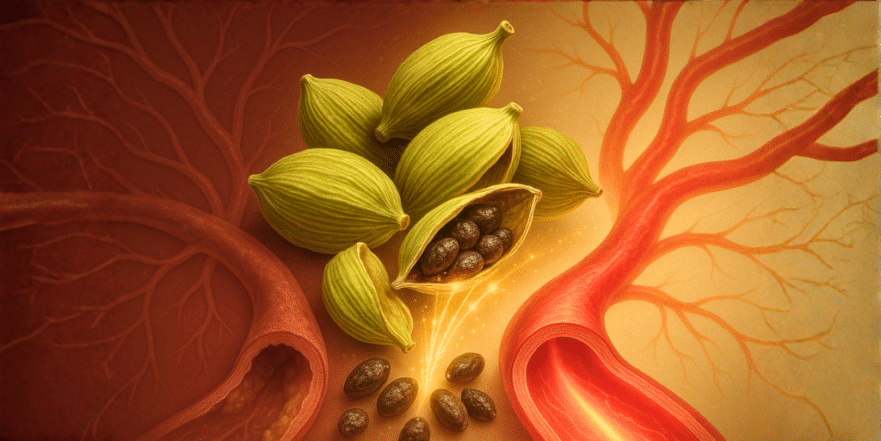
This week, something surprising happened. I reached into the pantry, grabbed that little green pod I’d seen a hundred times, and finally asked myself, “What exactly does cardamom do?” Turns out, this ancient spice could be one of the simplest ways to help open your arteries and support your heart—without any fuss.
Key Takeaways

- Cardamom may help lower blood pressure and fight inflammation
- Supports digestion, freshens breath, and may even boost metabolism
- Easy to add to food, drinks, or simply chew after a meal
- Packed with natural compounds that help with blood flow and overall wellness
What Is Green Cardamom?
Cardamom isn’t new on the scene. People have used it for thousands of years across Asia and the Middle East, mostly in cooking. But those little green pods you see? They’re not just for flavor. They come loaded with seeds that pack a punch for all sorts of health issues.
When you look at a pod, open it up—those tiny black seeds inside are where the magic lies. Chefs love it. Nutritionists are starting to take it seriously. And ordinary folks are using cardamom as an everyday remedy.
Health Benefits Of Cardamom Explained
Cardamom isn’t a miracle cure, but it sure comes close to being a kitchen all-star. Here’s why:
1. Supports Digestive Health
- Reduces bloating and gas
- Helps with indigestion
- Chewing cardamom or drinking it as tea may soothe your stomach after a big meal
2. Natural Anti-Inflammatory
- Contains compounds that may help ease joint pain
- Can decrease swelling inside the body—whether it’s your guts, joints, or even your arteries
3. Good For Your Mouth
- Freshens breath (nature’s breath mint)
- May help reduce bacteria in the mouth, supporting oral health
4. Respiratory Help
- Soothes cough and congestion
- Acts as an expectorant (helps clear mucus)
5. May Help Manage Body Weight
- Can boost metabolism
- Potentially improves how your body handles fats
6. Supports Blood Pressure And Healthy Arteries
Why does any of this matter for your heart and arteries? It comes down to three main actions cardamom is believed to have:
| Benefit | How It Helps Your Arteries |
|---|---|
| Natural Diuretic | Helps your body get rid of extra fluid, reducing the pressure in your blood vessels |
| Vasodilation | Relaxes and opens arteries, making it easier for blood to flow |
| Antioxidant/Anti-hypertensive | Fights inflammation and stress that can damage arteries |
Cardamom is rich in antioxidants. It reduces oxidative stress—that’s that slow wear and tear that raises blood pressure. The spice also contains natural chemicals, like terpenoids, phenolics, and flavonoids, all linked to keeping arteries happy and flexible.
Simple Ways To Use Cardamom Everyday
Here’s where it gets fun: turning cardamom into a habit is easy. No need for fancy recipes!
How To Use It:
- Toss cardamom powder into your coffee, tea, or smoothie
- Sprinkle it on top of warm oats or yogurt
- Add whole pods to cooking: curries, stews, even desserts
- Smash a few pods, steep in boiling water for 10 minutes, then drink as a tea
- Chew on a pod after eating to freshen up and help digestion (bonus: extra fiber from the seeds)
You really don’t have to overthink it. A third of a teaspoon of powder is plenty for your tea. For the brave, chew a pod or two after a big meal. Just remember to spit the pod shell out—they’re pretty tough.
Why Should You Care About Inflammation?
Medical experts emphasize a crucial point: almost every sickness begins with inflammation. That includes arthritis, gut trouble (think colitis, gastritis), and—yep—high blood pressure. Cardamom may help your gut, joints, and arteries at the same time.
It’s all about giving your body a small, daily helper. You might notice less bloating, better breath, a little more pep. Will it cure everything overnight? Nope. But it can be one more tool in your daily routine.
Is Cardamom Safe For Everyone?
Most people can enjoy cardamom as part of their everyday meals without worry. Still, if you’re on medication for blood pressure, check in with your doctor. Cardamom does have strong effects, especially if you’re sensitive or take other diuretics.
Keep In Mind:
- Start with small amounts if you’re new to it
- Monitor your blood pressure, especially if you already take medication
- Listen to your body: if something doesn’t sit right, ease off
Bottom Line: Why Cardamom Deserves A Spot In Your Daily Routine
At the end of the day, cardamom is simple and easy to use. A little bit can help your digestion, clear your breath, and maybe even keep your arteries a little more open. You don’t need a big plan—just try adding it to things you already enjoy. It’s a tiny change that might make a real difference.
Next time you’re in the grocery store, grab a pouch of those green pods. Sprinkle, brew, chew—however you like it.
Here’s to mixing a little ancient wisdom into our modern lives—starting right in your own kitchen.
Source: Dr. Mandell

